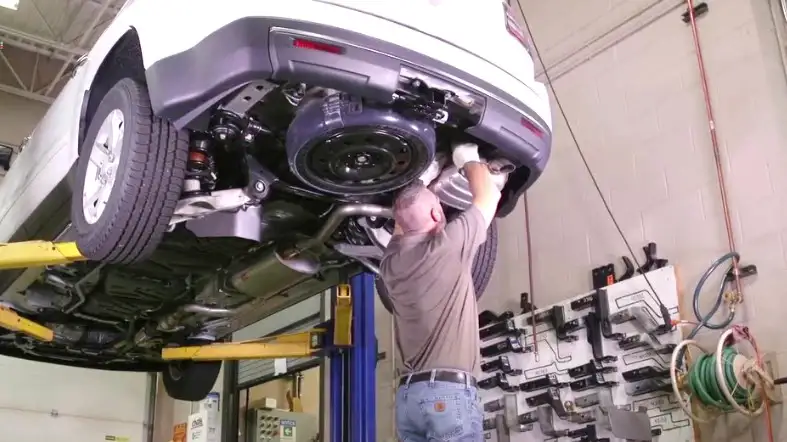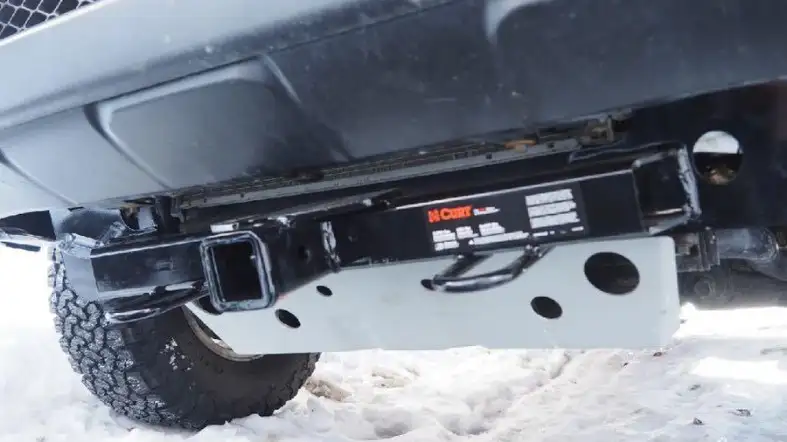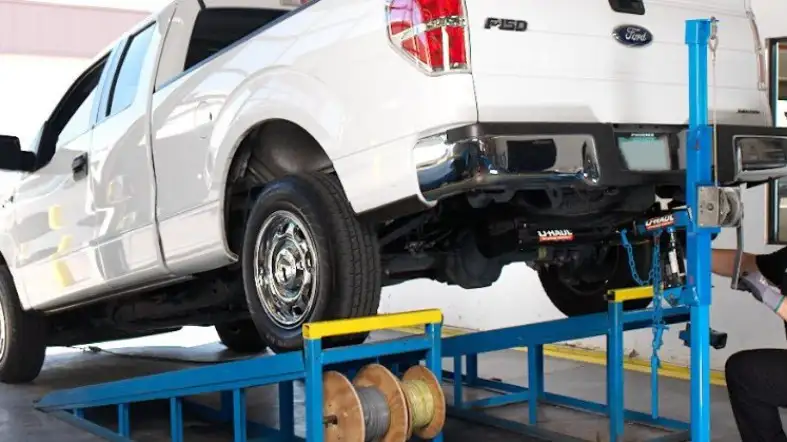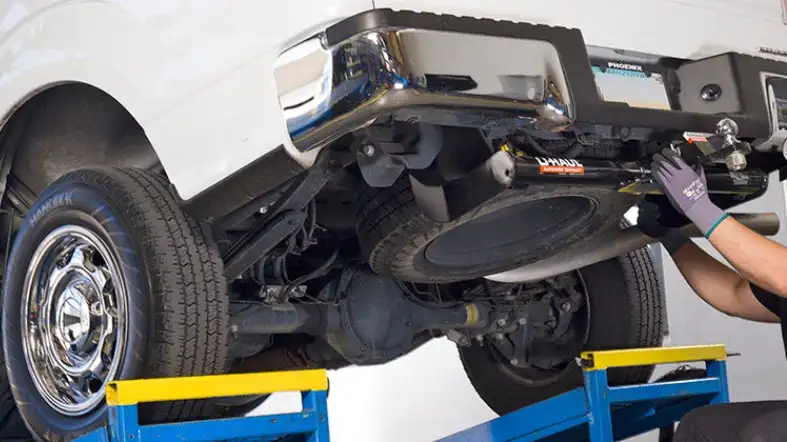Whether you’re looking to haul a trailer or just want the option to do so in the future, finding the right place to have a hitch installed is crucial.
In this blog post, we’ll discuss some of the best places to get a hitch installed, so you can make an informed decision about where to take your vehicle.
So, if you’re in the market for a hitch, keep reading to learn more!
Where to Go to Install my Hitch?
The best place to get a hitch installed is at a certified automotive repair shop.
Many shops specialize in hitch installation, and they will have the necessary tools and expertise to install the hitch properly.
It is important to ensure that the shop is certified and has experience with hitch installation.
Additionally, it is recommended to research the shop and read reviews to ensure that they provide quality service.

Some places that may be able to help you with hitch installation include:
Auto repair shops:
These are businesses that specialize in repairing and maintaining vehicles.
Many auto repair shops offer a wide range of services, including hitch installation.
The mechanics at these shops will have the tools and expertise needed to install a hitch on your vehicle.
Trailer dealerships or repair shops:
These businesses specialize in selling and repairing trailers.
They may also offer hitch installation services, as well as other types of accessory installation.
Truck accessory stores:
These stores specialize in selling accessories for trucks, including hitches.
Some of these stores may also offer installation services for the products that they sell.
RV dealerships or repair shops:
These businesses specialize in selling and repairing recreational vehicles (RVs).
They may also offer hitch installation services, as well as other types of accessory installation.
How Much Does It Cost To Get A Hitch Installed?

The cost of getting a hitch installed can vary depending on a number of factors, including:
- The type of hitch you are having installed
- The make and model of your vehicle
- The location of the business where you are having the hitch installed
- Any additional features or customization that you may want
In general, you can expect to pay anywhere from $100 to $1,000 or more for hitch installation.
Some common types of hitches and their approximate costs for installation are:
- Class I hitch (light-duty): $100 to $300
- Class II hitch (medium-duty): $200 to $400
- Class III hitch (heavy-duty): $300 to $700
- Class IV hitch (extra heavy-duty): $400 to $1,000 or more
It is important to note that these are just estimates and the actual cost may vary.
It is always a good idea to shop around and get quotes from multiple businesses before making a decision.
You may also want to ask about any additional fees or charges that may not be included in the initial quote.
What Are The Benefits Of Getting A Hitch Installed Instead Of Doing It By Myself?

There are several benefits to having a professional install a hitch on your vehicle rather than doing it yourself:
Safety:
Hitch installation can be a complex and potentially dangerous process.
A professional has the expertise and experience to install the hitch correctly, ensuring that it is safe to use.
Quality:
A professional hitch installation will be done to a high standard, ensuring that the hitch is securely attached to your vehicle and will function properly.
Warranty:
Many hitch manufacturers will not honor their warranties if the hitch was not installed by a professional.
Having a professional install the hitch ensures that you will be covered in the event of a problem.
Time:
Hitch installation can be time-consuming, especially if you are not familiar with the process.
A professional can install the hitch quickly and efficiently, saving you time and effort.
Convenience:
A professional hitch installation service will come to you and install the hitch at your location, making the process convenient and hassle-free.
Overall, having a professional install a hitch on your vehicle is a good idea for the added safety, quality, and convenience it provides.
What to consider before getting a hitch installed?
There are several things that you should consider before getting a hitch installed on your vehicle:
Compatibility:
Make sure that the hitch is compatible with your vehicle.
Different vehicles have different weight capacities and towing capabilities, and it is important to choose a hitch that is appropriate for your vehicle.
Towing capacity:
Consider the weight of the items that you will be towing with the hitch.
Make sure that the hitch and your vehicle are capable of safely towing the weight of the load.
Installation location:
Consider where on your vehicle you want the hitch to be installed.
Some vehicles may have multiple locations where a hitch can be installed, and the location may affect the cost and difficulty of the installation.
Type of hitch:
There are several different types of hitches available, and each one is designed for a specific purpose.
Choose a hitch that is suitable for your needs and the type of towing that you will be doing.
Professional installation:
It is generally a good idea to have a hitch installed by a professional mechanic or an auto shop that specializes in hitch installation.
This will ensure that the hitch is installed safely and correctly.
Cost:
Consider the cost of the hitch and the installation when making your decision.
Don’t forget to factor in any additional fees or charges that may not be included in the initial quote.
What Kind Of Maintenance do I Need To Follow After Hitch Installation?

After having a hitch installed on your vehicle, it is important to follow proper maintenance procedures.
It ensures that the hitch is in good working order and that it is safe to use. Here are some things to consider:
Inspect the hitch regularly:
Periodically inspect the hitch and the mounting hardware for any signs of wear or damage.
If you notice any problems, have them repaired by a professional as soon as possible.
Tighten the mounting hardware:
Over time, the mounting hardware for the hitch may become loose.
Make sure to regularly check and tighten the hardware to ensure that the hitch is securely attached to your vehicle.
Lubricate the hitch:
Lubricating the hitch can help to prevent rust and other types of corrosion.
Use a high-quality lubricant and apply it to the hitch according to the manufacturer’s recommendations.
Use the hitch within its capacity:
Do not exceed the weight capacity of the hitch or your vehicle’s towing capacity.
This can cause damage to the hitch and your vehicle and can be dangerous.
Follow proper towing procedures:
When towing with the hitch, make sure to follow proper towing procedures to ensure the safety of you, your passengers, and other drivers on the road.
This includes using the proper towing equipment, such as a weight distributing hitch or sway control, as needed.
By following these maintenance tips, you can help to ensure that your hitch stays in good working order and is safe to use.
FAQs about the best places to get a hitch installed
Where Can I Get A Hitch Installed?
Some options for getting a hitch installed include auto repair shops, trailer dealerships or repair shops, truck accessory stores, and RV dealerships or repair shops.
How Do I Choose The Best Place To Get A Hitch Installed?
When choosing a place to get a hitch installed, it is important to consider factors such as the reputation of the business, the cost of the installation, and the location.
You may also want to read reviews and ask for recommendations from friends or family.
Can I Install A Hitch Myself?
While it is possible to install a hitch yourself, it is generally recommended to have a hitch installed by a professional mechanic or an auto shop that specializes in hitch installation.
This will ensure that the hitch is installed safely and correctly.
How Much Does It Cost To Get A Hitch Installed?
The cost of hitch installation can vary depending on the type of hitch, the make and model of your vehicle, and the location of the business.
In general, you can expect to pay anywhere from $100 to $1,000 or more for hitch installation.
What Should I Consider Before Getting A Hitch Installed?
Some things to consider before getting a hitch installed include compatibility with your vehicle, towing capacity, installation location, type of hitch, professional installation, and cost.
It is also important to follow proper maintenance procedures after the hitch is installed to ensure its safety and longevity.
Conclusion
Having a hitch installed on your vehicle can be a convenient and useful addition, especially if you plan on towing items such as trailers or recreational vehicles.
It is important to choose a reputable and reliable business to ensure that the hitch is installed safely and correctly.
By following proper maintenance procedures and using the hitch within its capacity, you can help to ensure that it stays in good working order and is safe to use.
